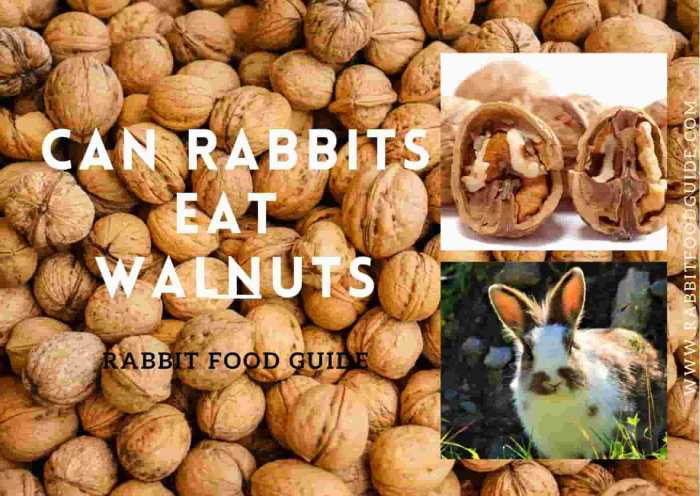Walnuts are a nutritious and versatile food enjoyed by humans worldwide. But can rabbits, our furry little companions, partake in this nutty treat? The answer is yes, but with caution. Understanding the nutritional value, safety considerations, and proper preparation techniques is crucial to ensure a safe and enjoyable walnut-eating experience for your rabbit.
In this guide, we will delve into the world of walnuts and rabbits, exploring the potential benefits and risks associated with feeding walnuts to your bunny. We will also provide tips on how to prepare and serve walnuts safely, as well as alternative nut options that are suitable for rabbit consumption.
Nutritional Information
Walnuts are a nutrient-rich food that can provide several health benefits for rabbits. They are a good source of energy, protein, and fiber, and they also contain essential vitamins and minerals. The following table provides a detailed breakdown of the nutritional content of walnuts:
| Nutrient | Amount per 100g |
|---|---|
| Calories | 654 |
| Fat | 65g |
| Protein | 15g |
| Fiber | 10g |
| Vitamin E | 10mg |
| Vitamin B6 | 1mg |
| Manganese | 1mg |
The high fiber content of walnuts is particularly beneficial for rabbits. Fiber helps to keep the digestive system healthy and can help to prevent problems such as constipation and diarrhea. Walnuts also contain antioxidants, which can help to protect the body against damage from free radicals.
Health Benefits
Walnuts can provide several health benefits for rabbits, including:
- Improved digestion
- Reduced risk of constipation and diarrhea
- Protection against free radical damage
Safety Considerations
While walnuts can provide some nutritional benefits to rabbits, it’s crucial to consider potential risks before feeding them to your furry friend.
Choking Hazard: Walnuts are relatively large and hard, posing a choking hazard for rabbits, especially younger or smaller ones. Ensure walnuts are broken into smaller pieces before offering them to your rabbit.
Digestive Upset
Walnuts are high in fat and can cause digestive upset in rabbits if consumed in excessive amounts. Symptoms of digestive upset include diarrhea, vomiting, and loss of appetite. Introduce walnuts gradually and monitor your rabbit’s response.
Health Conditions
Avoid feeding walnuts to rabbits with certain health conditions, such as obesity or gastrointestinal issues. The high fat content in walnuts can exacerbate these conditions.
Preparation and Serving
Preparing walnuts for rabbits is crucial to ensure their safety and enjoyment. Start by removing the hard shells. You can use a nutcracker or a hammer to crack them open gently. Once the shells are removed, chop the walnuts into small pieces to prevent choking hazards.
Appropriate Serving Size and Frequency
The appropriate serving size for rabbits is approximately one teaspoon of chopped walnuts per day. This can be mixed into their regular diet or offered as a treat. Avoid overfeeding walnuts, as they are high in fat and can lead to digestive issues if consumed excessively.
Alternative Nut Options
While walnuts are not a suitable dietary option for rabbits, there are several other types of nuts that can be safely consumed by these animals. These alternative nut options provide various nutritional benefits and can be incorporated into a rabbit’s diet in moderation.
Almonds
- Nutritional Benefits: Almonds are a rich source of protein, fiber, and healthy fats. They also contain essential vitamins and minerals, including vitamin E, magnesium, and calcium.
- Potential Risks: Almonds should be given to rabbits in small quantities, as they are high in fat and can cause digestive upset if consumed in excess.
Hazelnuts
- Nutritional Benefits: Hazelnuts are a good source of protein, fiber, and antioxidants. They also contain vitamins and minerals, such as vitamin B6, manganese, and copper.
- Potential Risks: Hazelnuts are higher in fat than other nuts, so they should be given to rabbits sparingly to avoid weight gain and digestive issues.
Pecans
- Nutritional Benefits: Pecans are a rich source of protein, fiber, and monounsaturated fats. They also contain antioxidants and essential vitamins and minerals.
- Potential Risks: Pecans are higher in calories than other nuts, so they should be given to rabbits in moderation to prevent weight gain.
Closing Summary

In conclusion, walnuts can be a healthy and occasional treat for rabbits when fed in moderation and prepared appropriately. Their high fiber content and antioxidant properties can provide certain health benefits. However, it is essential to be mindful of the potential risks, such as choking hazards and digestive upset, and to avoid feeding walnuts to rabbits with certain health conditions.
By following the guidelines Artikeld in this guide, you can safely introduce walnuts into your rabbit’s diet and provide them with a nutritious and enriching snack. Remember, a balanced and varied diet remains the cornerstone of good rabbit health, and walnuts should only be offered as an occasional treat.
FAQs
Can rabbits eat walnut shells?
No, walnut shells are not digestible by rabbits and should not be offered to them.
How often can I feed walnuts to my rabbit?
Walnuts should be fed as an occasional treat, no more than once or twice a week, and in small quantities.
What are some alternative nuts that rabbits can eat?
Almonds, hazelnuts, and pecans are all safe nuts for rabbits to eat in moderation.